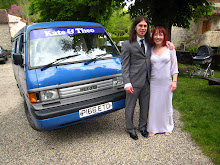"Mama viene. NOW."
"Mas leche. NOW."
"Carry cuddle! NOW."
"Daddy up! NOW."
"Mas pan! NOW."

Rosie is rather imperative. It's unsurprising as regardless of the language most of the sentences we model for her are imperatives - "come here", "pon lo aqui", "hold my hand". So naturally as she begins to string sentences together from individual words, they are often orders, made with a sense of impatience and awareness that others may not have the same priorities that she clearly gets from her father.
She does descriptions as well, often related to clothing ("slippers off", "lleva gafas", "Rosie tired/cansada") and even has a few anecdotes that, with prompting from Kate, she can recount. One goes like this:
Kate: Rudy (a fellow toddler) tried to cuddle you.
Rosie: Mummy say "No kick!"
It's all astoundingly endearing (she had the museum attendant enraptured by her ability to say "cardie on" at the M Shed) and totally fascinating the way Rosie is acquiring and structuring language. Naturally her English is far more developed than her Spanish; though I suspect this is in part due to the fact she is trying to use verb phrases which is far easier in English ("he/she" form aside, the present tense and imperative are the same) than in Spanish, with its multiple endings and irregularities. For example she has been experimenting with the verb "ser" (to be): sometimes she gets it right by saying (to Kate) "es Papa!" ("it's Dad!"). But when she tells me "soy Papa", that's the wrong form - it's what I would say to her: Rosie needs to say "eres Papa". OK, the English version of this (am/are/is) wouldn't be much easier, but most English verbs don't change so dramatically.




No comments:
Post a Comment